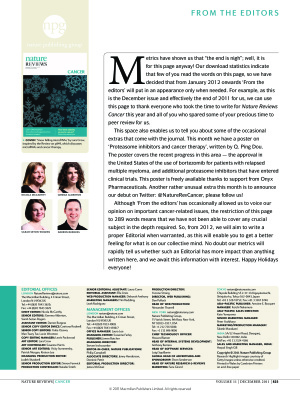Nature Reviews Cancer — медицинский научный журнал, издаваемый
Nature Publishing Group с 2001 года, посвященный исследованиям в
области онкологии. http://www.nature.com/nrc/index.html.
Журнал публикует статьи, посвящённые последним достижениям в области борьбы с раком. Основные направления исследований, представленные в журнале, включают в себя:
o Нестабильность генома.
o Клеточное бессмертие.
o Смерть клеток.
o Ангиогенез.
o Метастазы.
o Канцерогенез и профилактика рака.
o Диагностика рака.
o Новые подходы к раковой терапии.
o Экспериментальные системы и технологии.
o Болезни, сопутствующие раковым заболеваниям.
o Этические, правовые и социальные вопросы, касающиеся онкологических исследований.
o Стандартные подходы к диагностике и лечению рака.
The ultimate aim of cancer research is to eliminate this common and devastating disease from the human population. To develop more effective prevention methods we need to understand what triggers carcinogenesis. To diagnose precancerous lesions and early-stage cancers quickly and accurately we need to detect the earliest molecular changes leading to each type of cancer. To determine a patient"s prognosis we need to appreciate which molecular changes affect tumour growth rate and invasiveness. And to tailor therapies to individual tumours we need to understand the fundamental differences, not only between a cancer cell and a "normal" cell, but also between one cancer cell and another. All of these goals depend on a combination of basic and applied research.
Журнал публикует статьи, посвящённые последним достижениям в области борьбы с раком. Основные направления исследований, представленные в журнале, включают в себя:
o Нестабильность генома.
o Клеточное бессмертие.
o Смерть клеток.
o Ангиогенез.
o Метастазы.
o Канцерогенез и профилактика рака.
o Диагностика рака.
o Новые подходы к раковой терапии.
o Экспериментальные системы и технологии.
o Болезни, сопутствующие раковым заболеваниям.
o Этические, правовые и социальные вопросы, касающиеся онкологических исследований.
o Стандартные подходы к диагностике и лечению рака.
The ultimate aim of cancer research is to eliminate this common and devastating disease from the human population. To develop more effective prevention methods we need to understand what triggers carcinogenesis. To diagnose precancerous lesions and early-stage cancers quickly and accurately we need to detect the earliest molecular changes leading to each type of cancer. To determine a patient"s prognosis we need to appreciate which molecular changes affect tumour growth rate and invasiveness. And to tailor therapies to individual tumours we need to understand the fundamental differences, not only between a cancer cell and a "normal" cell, but also between one cancer cell and another. All of these goals depend on a combination of basic and applied research.

